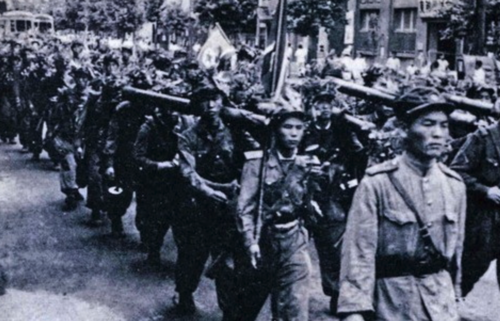The 25th of this month is the 70th anniversary of North Korea’s invasion of the South, beginning what Americans call the Korean War. The fighting ended with an armistice in July 1953. No peace treaty has been signed. The war, albeit by less deadly means, continues.
The conflict began with a surprise invasion, and from time to time the North Koreans still, with deadly consequences, catch Americans and South Koreans off-guard.
Why? The North understands the war is not over. Unfortunately, oblivious American and naïve South Korean officials forget this essential fact. The Kim regime, unfortunately, cannot survive on a peaceful peninsula.
The Kim family, through three generations, has staked its legitimacy on the right to rule all Korea, and this means it must eliminate the other Korean state, the Republic of Korea. Pyongyang tars the South as a mere puppet of Washington, itself the main enemy. Accordingly, one of the North’s worst insults is “pro-U.S. flunkeyism,” something Kim Yo-jong, the younger sister of the North Korean leader, hurled at Seoul this month when she demolished the liaison office in Kaesong. “Submission” is also a favorite term.
This innate hostility has meant that the leadership of the Democratic People’s Republic of Korea has felt least comfortable when American and South Korean leaders have turned on the charm.
At the moment, Presidents Donald Trump and Moon Jae-in are trying to be especially charming. Moon often gives the impression he would make any concession if only Kim Jong-un, the North Korean supremo , would agree to unify the two Koreas. Yet this month the harsh language from Ms. Kim—shelabeled South Korea the “enemy”—suggests things are not going well for Mr. Moon.
Moon’s two “progressive” predecessors, Kim Dae-jung and Roh Moo-hyun, did not have much better luck in developing cooperative relations with Mr. Kim’s father, Kim Jong-il.
Moreover, Trump’s two-year effort at courtship of Kim Jong-un—Trumponce said he and Kim “fell in love”—has not worked. Three summits between Trump and Kim—in Singapore, Hanoi, and the Demilitarized Zone—have produced no progress toward “denuclearization.”
The inconvenient truth is that Kim leaders cannot be enticed into good behavior for more than a few months.
So, what to do? Trump actually devised and implemented a good strategy in his first months in office. He may have insulted Kim Jong-un a few too many times, but Trump substantially reduced money flows to the regime by enforcing sanctions, cutting the flow of cash in half,according to Wall Street Journal reporting.
In June 2017, Trump even went after North Korean money flowing through a small Chinese bank, the Bank of Dandong. He declared it a “primary money laundering concern” pursuant to Section 311 of the Patriot Act, thereby cutting it off from correspondent banking relationships in New York.
Then, in the weeks before the historic Singapore summit, Trump, as a good will gesture, let up sanctions enforcement. Kim was therefore able to get all the cash needed to sustain his rule and build up his dangerous arsenals.
Unfortunately, the international community has suffered through eight decades of Kim family behavior and learned that cooperative relations with the regime are not possible. As Stapleton Roy, the former U.S. ambassador, once told me, “No one has found a way to persuade North Korea to move in sensible directions.”
He’s right. By now we should know that North Korea is so intransigent that there is nothing the world can do other than sanction the regime into the ground.
It has been only recently that Washington has signaled it will go back to rigorous sanctions enforcement. Late May, the U.S. Justice Departmentobtained indictments of 28 North Koreans and five Chinese individuals for running money laundering operations in, among other locations, China and Russia.
These charges by themselves do not cut money flows, but the Trump administration is signaling it has lost patience and will start going after Kim Jong-un’s smuggling rings.
For the Kim regime, this would be a particularly bad time for Trump to get angry. The North Korean economy, Fitch Solutions estimates,could contract 6 percent this year. The closing of the border with China because of the coronavirus epidemic has cut off a vital flow of cash. A 6 percent contraction would be the worst downturn for the regime since 1997, a famine year.
In the past, Beijing saved the Kims from themselves with economic lifelines, but now the Chinese economy itself is in distress. China’s gross domesticproduct fell 6.8 percent in the first calendar quarter of this year according to the official National Bureau of Statistics, but the real figure could be twice that. This quarter does not seem appreciably better, the result of systemic weaknesses, such as excessive debt and increasing state control, as well as disease.
The North, therefore, is particularly vulnerable to vigorous American-led sanctions enforcement. Moreover, this would be the perfect time to end the Kim family’s participation in criminal activities. The family is believed to have stolen something on the order of $2 billion last year by cyber means, and it is engaged in all sorts of illicit enterprises.
So, if there is no money coming into Pyongyang’s coffers, there is no nuclear weapons arsenal, no ballistic missile program, no regime.
Only when the world rids itself of the Kim family will there be peace on the Korean peninsula—and an end to the war that began seventy years ago.
Gordon G. Chang is the author of The Coming Collapse of China.
Gordon G. Chang is the author of Nuclear Showdown: North Korea Takes On the World and Losing South Korea. Follow him on Twitter@GordonGChang.


